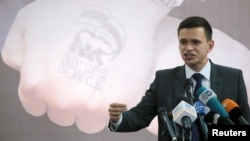United Russia, the ruling political party best known for its loyalty to President Vladimir Putin and the Kremlin, has essentially become a tool of political legitimization for organized crime, according to an opposition party report published Tuesday titled "The Criminal Russia Party."
"I think that the title of the report quite accurately reflects its contents," Ilya Yashin, deputy chairman of the opposition People's Freedom Party, was quoted as saying earlier this month.
"United Russia, over the years of its existence, has turned into a full-fledged social elevator for organized crime, criminal groups and individual criminals, who are using the party to reach a new level in their criminal activities, to integrate with the state power bodies," he said.
In his 66-page report, Yashin offers a long list of United Russia members accused of involvement in – or even organizing – various high-profile crimes. They include Vyacheslav Gaizer, former governor of northwestern Russia’s Komi Republic, who was arrested in 2015 for operating a criminal group involved in the large-scale theft of state property; Alexander Khoroshavin, former governor of the Far Eastern Russian region of Sakhalin, who was also arrested last year for alleged large-scale embezzlement and bribe-taking; Said Amirov, the former mayor of Makhachkala, the capital of North Caucasian republic of Dagestan, who was sentenced last year to life in prison for murder and other crimes; and many others.
United Russia reportedly repudiated the listed members when they became targets of the country's prosecutors.
"The bouquet of crimes associated with this party covers the entire criminal code," Yashin said Tuesday in Moscow. "It's not just about fraud and stealing, but also about other, much more serious articles of the criminal code."
Response to report
Yashin's report received little immediate attention in Moscow, apart from a derisive online commentary by Pravda.ru, a private group that uses the name of the former official newspaper of the Communist Party of the Soviet Union.
"Ilya Yashin's report entirely consists of distorted facts, misinterpreted quotes and events," Pravda.ru said.
Corruption in Russia is real, the commentary added, but "Yashin did not conduct any investigations or studies," and the way in which he interpreted information he gathered on the internet made his report "a collection of lies from beginning to end."
'Party of crooks and thieves'
With elections to the State Duma, the lower house of Russia's parliament, set to take place Sept. 18, Yashin said his goal is to show that United Russia is "the party of crooks and thieves," as anti-corruption blogger Alexei Navalny first termed it in 2011.
In an April 2011 survey by the Levada Center, Russia's only independent national polling agency, 31 percent of respondents said they agreed with the view that United Russia is "the party of crooks and thieves." That number rose to 38 percent in a Levada survey conducted in September 2012, and to 51 percent in an April 2013 Levada poll.
Following large opposition protests in December 2011, Putin himself rejected characterizing United Russia as "the party of crooks and thieves," saying corruption was not limited to one political party and adding: "What's important, however, is how the ruling government is fighting these negative things."
Gennady Gudkov, a retired KGB colonel who is a former State Duma deputy, told VOA's Russian service that the "power vertical" which has been erected in the country is a direct path for illicit enrichment.
"The system not only ensures the loyalty of the authorities, but to a significant extent allows their appointees to act almost uncontrollably," he said. "By and large, the main objective of our government is the preservation of power for continued illegal enrichment."
Looting ‘with impunity’
Over the years, the system has formed an entire class of people who have made their money by criminal means, Gudkov said.
"Therefore, the powers that be are prepared to defend by any means their right to plunder the national wealth uncontrollably and with impunity," he said. "They behave like occupiers. It is a soft occupation, which has not led so far to the creation of concentration camps and the like. But, in general, the looting is in full swing."
According to Gudkov, the system simply cannot live without corruption and kickbacks — leaving nothing left over for development and creation.
"Naturally, under these conditions, theft and enrichment at any cost becomes an end in itself," Gudkov said.
For his part, Alexei Kondaurov, a retired KGB general who also served in the State Duma, believes people try to "lean" toward the ruling party in order to get certain benefits.
Party affiliation, protection
"This is definitely the case," he told VOA's Russian service. "Among those who move toward [United Russia] are criminals seeking a ‘roof’ [Russian slang for ‘protection’], although this does not mean that an overwhelming number of people with a criminal record are in the party."
If the ruling party did not provide the possibility of getting cushy jobs, no one would have any use for it, Kondaurov said.
"After all, this party does not have, and could not have, anything for the soul," he said. "People do not join it out of ideological conviction. Moreover, it is absolutely unclear what its ideology actually is, other than professing love for the top leadership."




